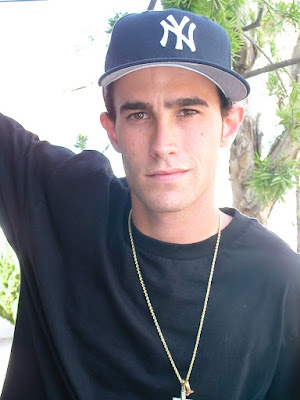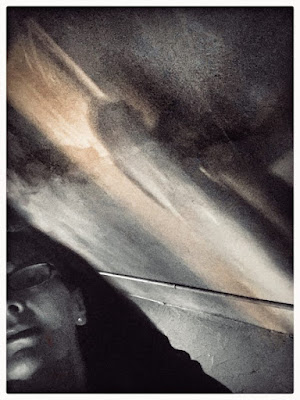Christal Cooper
*
Article with excerpts – 1,594 Words
All
excerpts are given copyright privilege by Alexis Rhone Fancher and KYSO Flash.
STATE OF GRACE:
THE JOSHUA
ELEGIES
Poems
& Photography by Alexis Rhone Fancher
“Dealing With Death One Poem At A Time”
Los
Angeles based photographer and poet Alexis Rhone Fancher’s second poetry
collection, the chapbook State of Grace: The Joshua Elegies, has been
published by KYSO Flash in October 2015.
The
collection, accompanied by Fancher’s photographs is focused on the dying,
death, and grief of her son Joshua Dorian Rhone, who was born one month
premature on December 14, 1980.
Joshua & Jeffrey Sedona Arizona 1989
“After he was born, the nurses brought him to me in a
bassinet on wheels. He had the most
intense brown eyes I’d ever seen. We
stared at each other for a very long time.
Soul to Soul. I wrote “Baby Boy Blues” about my feeling of unease about
the future – like those old women knew something I didn’t.”
Baby
Boy Blues
When he was born,
the old ladies peered
into the cradle,
cooed and clucked.
“If he lives,” one of
them whispered.
“he’ll be a real looker.”
The
feisty and strong baby grew to be 6’4, and led a full and healthy life.
“He was
always generous, and kind to everyone. Incredibly handsome - from birth. We’d
be shopping in the mall, and girls would walk up to him and hand him their
phone numbers, written on small pieces of paper, neatly folded, and beg him to
call. After he died
I found a ton of those notes, crammed in
a drawer.”
It
wasn’t until 2005 that Fancher and Joshua recognized a growth forming on Joshua’s
right arm, mid-way, near the elbow.
“It was growing at a very fast pace. We went in to have it looked at and were
referred to the oncology department of UCLA.”
It
was during the exploratory surgery on his right arm at UCLA Hospital in Santa
Monica that Joshua was diagnosed with epithelioid sarcoma, a rare soft-tissue
tumor most often found in young adults, with known propensity for local
recurrence, regional lymph node involvement, and distance metastases. The outcome was not good – death within two
years.
“My son was
a free spirit, and in love with life. He loved
sports more than anything - baseball, hockey, and martial arts - but his
great passion was basketball. In the days before the amputation surgery, he
played basketball for hours and hours. He was positive, and self-deprecating,
and without doubt the most courageous man I have ever met.”
Joshua died on September 14, 2007 in the
presence of his mother and other family.
Two
weeks after her son’s death, Fancher had a hurtful encounter with a casual
friend who inquired if she was over her son’s death. This experience scarred her and made her
son’s death even more painful to endure.
“The
poem “Over It” was written in response to
the utter thoughtlessness of a friend two weeks after my son died. However, I
didn’t write the poem until 2012. It took that long to digest it.”
Two
weeks after he died,
a friend asked if I was “over it.”
As if my son’s death was something
to get
through, like the flu.
Excerpt,
“Over It”
The
first poem she wrote from the collection is “The Supermarket And A State of
Grace” while studying under the great Jack Grapes.
Jack Gilbert
“When I was
choosing what to include in the chapbook, “The Supermarket And A State of
Grace” set the tone. It could be considered a prose poem. I thought it served
as an Author’s Note, as well.”
The supermarket is a good place to
grieve. I can roam from aisle to aisle,
safe behind dark glasses.
-Excerpt,
“The Supermarket and a State of Grace”
In
“Dying Young” Fancher was dealing with Joshua’s dying and her confidant Kate
O’Donnell’s losing cancer battle at the same time.
Kate O'Donnell
“I wanted to write a poem for Josh and
Kate. Put them together closely, as they
were in real life. They had a special
bond - we moved in with Kate after Josh and I
left his dad when he was three- he called her “Aunt Kate.” The poem began with
images in my head: fresh linens, the vision of my son, in that cabin in the woods,
alone and reflective; Kate, “reverting back to source,” me, at midnight,
sipping camomile tea; Josh’s beautiful girlfriend, Amy, standing alone in a
yellow dress, waiting.
Kate O'Donnell
The poem was my way of
working through this double dose of grief, by juxtaposing their stories. Kate
passed away in January of 2014. I miss her terribly.”
Kate O'Donnell
Kate's Kitchen
Dying
Young
Midnight,
and again I’m chasing
sleep: its fresh-linen smell and
deep
sinking, but when I close my eyes I see
my
son, closing his eyes. I’m afraid of
that dream,
the
tape-looped demise as cancer claims him.
My
artist friend cancels her L.A. trip.
Unplugs the
internet. Reverts to source. If cancer
will
not let go its grip then she will
return
its embrace. Squeeze the life out of
her
life. Ride it for all it’s worth.
By
the time his friends arrive at the cabin
my
son is exhausted, stays behind while
the
others set out on a hike. He picks up
the phone.
“Mom,
it’s so quiet here. The air has never
been
breathed before. It’s snowing.”
It
put on Mozart. A warm robe. Make a pot
of camomile
tea. The view from my 8th
floor
window,
spectacular, the silver moon, the stark,
neon-smeared
buildings, their windows dark.
Sometimes
I think I am the only one not sleeping.
My
artist friend wants to draw the rain.
She
wants
to paint her memoires, wrap the canvas
around
her like a burial shroud.
Tonight,
a girl in a yellow dress stands below
my
window, top lit by a street lamp, her long shadow
spilling
into the street. She’s waiting for
someone.
I
want to tell my friend I’ll miss her.
I
want to tell my son I understand.
I
want to tell the girl he won’t be coming.
That it’s nothing personal. He died young.
“I always
work directly on the computer. “Dying Young” was written quickly, maybe in a
few hours, but was repeatedly revised over several months before I felt it was
finished.”
Kate O'Donnell and Alexis Rhone Fancher
“Dying Young” was accepted for publication by Broad Magazine, along
with “Death Warrant,” in early 2014. It has since been republished by Cadence
Collective, and in Sybaritic Press’s Oscar
Wilde Anthology. It was a finalist in last year’s Poetry Super Highway poetry
contest.
In the
fall of 2014 Fancher gathered all her poems about her son and put them together
in a chapbook at her Los Angeles studio that she shares with her husband, whom
she calls “Fancher”.
“At that point there
were only 10 poems, so I kept writing. I told myself when there were an even dozen;
I’d submit the chapbook for publication. Those first ten poems had taken over
six years to write!”
Fancher assumed her chapbook was completed and
sent it out to publishers. It was
accepted by KYSO Flash Press, which Fancher described as a happy collaboration.
“I have the great good fortune to be working
with Clare MacQueen, who is a first-rate editor, as well as being a knowledgeable,
considerate publisher who is her word.
Clare MacQueen
Additionally, she, too,
has lost a child, her daughter, Kelley, who passed away in 2011. So there was
that bond as well.”
Kelley
After the book was accepted for publication
Fancher continued to write poems about her son: she wrote “When Her Son Is Dead Seven Years”, “When
You Think You’re Ready To Pack Up Your Grief”, and “Never Forget Why Your Wrist
Throbs” in September of 2015.”
Never
Forget Why Your Wrist Throbs
Look, when the insurance
runs out,
the ulna sets itself
that
clutch-at-the-railing/tumble down
two flights of Victorian
stairs,
babe in your arms, your
wrist
eagerly sacrificed to save
him.
Twenty something years
later,
after the boy gets cancer
and dies,
your body remembers,
hoards its wounds like a
black hole,
Your right wrist thicker
than your left
that knobby protrusion
a talisman you rub
while the blame feeds on
itself
Even now you know his
death
was your fault
Even now your body
yearns for him,
the arthritic ache that
pulses an
image of his face,
a supernova, each time it
rains.
Along
with the poems, are Fancher’s photographs, focused on the Los Angeles skyline,
a photograph of Joshua, and a self-portrait.
“The self-portrait I
chose for the back cover/author photo I shot at a restaurant, shortly before my
son died. In that photo I look like a train wreck, which was
precisely the way I felt. Every time I
look at that photo, it takes me back to that devastation.”
To
overcome this devastation, which still persists to this day, Fancher continues
to write poetry about her son and practices transcendental meditation.
“I have practiced T.M. for decades. It has always
helped to center me. I believe in a higher power. I pray upon occasion.”
It is during these moments of T.M, that
Fancher experiences “signs” everywhere that Joshua still exists and is close to
her side.
“A
psychic assured me Josh was close at hand.
Whether any of that is true, I have no
idea. I keep an open mind and heart.
I took classes with Dr.
Brian Weiss, a noted psychiatrist and believer in past lives. He wrote a bestseller
called Many Lives, Many Masters.
He says we incarnate
time after time, and that Joshua and I knew each other before and will again. I
want him to be right.”
You can reach Fancher via email at
alexis@lapoetrix.com
or
order State of Grace: The Joshua Elegies by clicking on the link
below: http://www.amazon.com/State-Grace-Alexis-Rhone-Fancher/dp/0986270326/ref=sr_1_5?ie=UTF8&qid=1447540998&sr=8-5&keywords=Alexis+Rhone+Fancher








































































